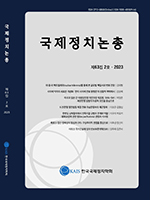
Background
The Korean Association of International Studies (KAIS) was founded in 1956 by Korean political scientists who recognized both the importance of international relations for South Korea and the discipline’s distinct scope and methodology. Since its establishment, KAIS has remained free from ideological bias and political partisanship, maintaining strict independence from any political parties or administrations. For more than six decades, the association has successfully upheld these principles.
From modest beginnings with fewer than ten founding members, KAIS has grown into one of the most prominent academic associations in Korea, now boasting more than 2,400 individual and institutional members. Over the years, it has organized annual meetings, international conferences, and numerous special seminars on a wide range of topics in domestic and foreign policy.
KAIS publishes two academic journals—one in Korean and one in English—and has also produced a wide array of books and textbooks in the field of international studies, making significant contributions to the advancement of scholarship in this area.
Beyond academic activities, KAIS has played an important role in meeting both theoretical and policy needs, contributing to the work of South Korean universities as well as the government. Thanks to its longstanding achievements, the dedication of its members, and its commitment to scholarly independence, KAIS is today regarded as one of Korea’s most respected and representative academic associations.
In 1963, the association launched The Korean Journal of International Relations (KJIR), its flagship Korean-language journal. Widely recognized as the leading journal in the field, KJIR has published the highest-quality research in Korea and continues to serve as a cornerstone of scholarship in international relations. It has accumulated outstanding contributions across the areas of international relations, foreign policy, comparative politics, and area studies, exerting significant influence on both policymaking and public discourse in Korea and abroad.
Aims and Scope
The Korean Journal of International Relations (KJIR) is the official peer-reviewed journal of the Korean Association of International Studies (KAIS). Published quarterly in March, June, September, and December, the journal provides a forum for scholarly research on global and regional affairs as well as theoretical debates in international relations and area studies.
The Korean Journal of International Relations (KJIR)
is indexed in the Korea Citation Index (KCI), ensuring broad visibility and academic impact. The journal welcomes original research articles that address enduring issues in East Asia—including those specific to the Korean Peninsula—as well as the wider implications of global and regional dynamics from diverse theoretical and methodological perspectives.
Its scope covers a wide range of topics, including international security, political economy, regionalism, environmental challenges, migration, civil society, and multiculturalism. KJIR does not adhere to any single theoretical or methodological approach, instead encouraging scholarly diversity across conceptual, normative, and empirical research.
By promoting high-quality scholarship, KJIR serves as a valuable platform for academic exchange and aims to contribute meaningfully to both scholarly discourse and policy debates. It also seeks to provide policymakers worldwide with in-depth analysis and thoughtful policy alternatives on contemporary global issues.
Publication Schedule
KJIR is published Four times a year, according to the following schedule :
• March 31 (Submission deadline : December 31)
• June 30 (Submission deadline : March 31)
• September 30 (Submission deadline : June 30)
• December 31 (Submission deadline : September 30)
Indexed in : KCI Excellent Accredited
